Deserving of respect
The state of disability support in Winnipeg
During the COVID-19 pandemic, essential workers have borne the brunt of exposure for the sake of the public. Direct support professionals (DSPs) – who work with people with developmental disabilities, either in day programs or around the clock in group homes – have only recently been given the “hero pay” premium afforded to other essential workers during the pandemic on top of their regular salaries.
While working with people with developmental disabilities during a pandemic places DSPs at a higher risk of getting sick than those working jobs with less human contact, the everyday reality of direct support in Winnipeg previous to the pandemic was already fraught with problems. While the community-based approach to disability care is an improvement on the institutional system, it is flawed and devalues the work of DSPs.

These archival photos from the 1950s show what is now known as the Manitoba Developmental Centre, which has housed many Manitobans with developmental disabilities starting in the late 19th century. Photos courtesy of Mary Horodyski

History
From the late 1800s to 1970s, Manitobans with developmental disabilities were housed in what is now known as the Manitoba Developmental Centre (MDC), which continues to operate on a reduced basis today. People First of Canada, an initiative of people with developmental disabilities, has advocated for the complete closure of MDC and other institutions because of the neglect and abuse many of them faced there.
David Weremy, an MDC survivor and winner of the Queen Elizabeth II Diamond Jubilee Medal for his anti-institutionalization activism, was quoted in the Institution Watch newsletter from People First: “An institution is no place for anybody to live. You don’t really live there – you just are there.”
In the 1960s, new models of community-based care started to develop, allowing people with developmental disabilities to live independently and have support workers come to their homes. In Manitoba, most direct support comes from for-profit enterprises, like DASCH, St. Amant, Epic Opportunities and Pulford Community Living Services.
Direct support professionals have a wide variety of roles, including assisting with financial decisions, arranging transportation and facilitating activities, as well as more physical supports like helping people to bathe, eat and dress. The benefit of community-based support is that people with developmental disabilities can find what works best for them, in a living situation they choose, which is a right afforded to them by Article 19 of the Convention on the Rights of Persons with Disabilities, ratified by the United Nations and Canada:
“a) Persons with disabilities have the opportunity to choose their place of residence and where and with whom they live on an equal basis with others and are not obliged to live in a particular living arrangement.
b) Persons with disabilities have access to a range of in-home, residential and other community-support services, including personal assistance necessary to support living and inclusion in the community, and to prevent isolation or segregation from the community.”

The #EssentialToUs campaign fought to secure pandemic “hero” pay for direct support professionals.
Noah’s story
The rights and freedoms of people with disabilities have been complicated by the pandemic. Noah Falk, a 22-year-old autistic artist, had been living half-time at a group home until the Code Red lockdown. Since then, he has been living at home full-time with his parents Kalyn and David Falk and attending a day program with ImagineAbility. While Noah is fun and friendly, he needs direct support in order to be his best self.
“If Noah can communicate, it is quite easy to live with him. If people don’t understand him, he can be very aggressive and can be very frustrated,” Kalyn Falk says. “With (Noah), you have to learn a whole new language, and you have to have a behavioural strategy. You can sometimes get choked and injured.”
Noah is able to thrive with the right DSP who has the ability to implement behavioural strategies, modifying their behaviour to meet Noah’s needs. However, when DSPs are themselves improperly supported by their agencies, it makes it more difficult for them to provide the best care.
Julia, whose name The Uniter changed to protect her identity against reprisal from her employer, is a DSP at a for-profit support agency in Winnipeg.
“I love being able to help people,” Julia says, “but there is definitely a lack of communication.” She says that staff meetings are rare, and she’s never seen a manager read the daily reports written at the end of each shift.
“Somebody called them absentee managers. I think that that’s probably a good way to describe it,” Linda Williams, a DSP in Winnipeg and Canadian Union of Public Employees (CUPE) executive, says. “It’s very hierarchical and top-down. (The managers all) want to do administration and write reports, but nobody wants to do the direct service” in homes, which would help them properly understand how things really work in the house.
This administrative disconnect can mean that decisions are being made that don’t reflect the needs or desires of DSPs or the people they support. Julia says that when organizations are buying new properties for their clients, “they’re buying them in newer developments, such as Sage Creek. Multiple staff members tend to bus to work, and there is not a (reliable) transit option during the day or into the evening.”
Wages
Many DSPs struggle to make ends meet because of the low salaries set by each agency, which is likely why so many of them use public transit. Julia continues to live with her parents and cannot afford to live independently or purchase a vehicle.
“The wage range is $13.75 to $15.05 (per hour). With such a high turnover rate in this field, it stands to reason that most (employees) are near the entry rate,” Williams says. “Every time you turn around, you’re dealing with a new manager or somebody else that you don’t know. It’s very difficult for staff, and just think how bad it is for the people that we serve. They’re the ones that suffer the most.”
Even though DSP work can be strenuous and difficult, their wages do not reflect the value of their labour.
“Noah’s had hundreds of workers already in his lifetime. He’s 22. They are fond of working with him, but as soon as they get a better job, they move on,” Kalyn Falk says. “Our last guy couldn’t afford to pay his rent, so he had to find a second job. He would work with Noah all day, and then he would work in a factory for eight hours. In the morning, he would come to our house completely exhausted.”

“Noah’s had hundreds of workers already in his lifetime. He’s 22. They are fond of working with him, but as soon as they get a better job, they move on.” - Kalyn Falk
During the pandemic
During the first year of the COVID-19 pandemic, Abilities Manitoba advocated for DSPs to receive “hero pay” through their #EssentialToUs initiative. They asked for a raise of wages to $15.11, with an additional $5 per hour premium for people directly working with COVID-19 patients.
The Manitoba government eventually instated the Caregiver Wage Support Program in early January 2021, which topped up the regular DSP salary by an extra $5 paid directly from the government. This program only covers working hours between Nov. 1, 2020 and Jan. 10, 2021.
While this program may be extended past Jan. 10, that leaves seven months of the pandemic unaccounted for. As well, the added premium will take most DSPs to $18 per hour, which is only just above a living wage.
During the time unaccounted for by the Caregiver Wage benefit, the Manitoba government initially failed to provide adequate protection for DSPs. In October 2020, CUPE reported that the Manitoba government provided home-care workers and DSPs with expired personal protective equipment (PPE). Manitoba teachers who received the same PPE reported to the media that the masks had started to cause rashes. Support agencies have since started to provide adequate PPE to DSPs, Williams says.
COVID-19 exposure
As of Jan. 10, 2021, the Manitoba government made COVID-19 vaccinations available to home-care workers, and DSPS have started to receive their vaccinations.
However, in the past year, St. Amant, Epic Opportunities and Pulford Community Living Services have all reported cases of COVID-19, and, in some cases, deaths of clients and staff. Mark Carreiro, who was supported at St. Amant, died Dec. 19 2020, after spending his last two weeks on a respirator.
“One worker got it in the backseat of the taxi going to the hospital with this guy, and, of course, the hospital doesn’t really want them either, because with (intellectually disabled people), you can’t keep masks on them. (Three residents) in that house caught it as well as staff,” Williams says. “I think this is going to go on for quite a while, (and) even though vaccines are coming out, there’s still danger everywhere.”
After the pandemic
Even after all DSPs in Winnipeg are vaccinated, and the pandemic is effectively over, the wage increase should be kept in place because of the importance of the work they do. A system that lacks administrative support, living wages and a COVID-safe environment is not built to succeed in a way that benefits everyone.
Noah is “deserving of respect and ... a good life, and the people who support him are also deserving of respect and a good life,” Kalyn Falk says.
Published in Volume 75, Number 15 of The Uniter (January 21, 2021)







